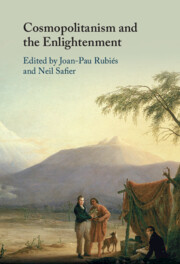Book contents
- Cosmopolitanism and the Enlightenment
- Cosmopolitanism and the Enlightenment
- Copyright page
- Dedication
- Contents
- Figures
- Contributors
- Preface
- Acknowledgments
- Introduction
- 1 Enlightenment Cosmopolitanism in Perspective
- 2 The Cosmopolitan Paradox
- 3 Diderot’s Conjectural History and the History of “Monstrous Nature”
- 4 Geographies of Cosmopolitanism
- 5 The Imperial, Global (Cosmopolitan) Dimensions of Nonelite Colonial Scribal Cultures in the Early Modern Iberian Atlantic
- 6 Gendered Cosmopolitanism?
- 7 Cosmopolitanism and the Creation of Patriotic Identities in the European Enlightenment
- 8 A Cosmopolitanism of Countervailing Powers
- 9 Cosmopolitanism and Civil War
- Afterword
- Index
2 - The Cosmopolitan Paradox
Travel, Anthropology, and the Problem of Cultural Diversity in Early Modern Thought
Published online by Cambridge University Press: 16 March 2023
- Cosmopolitanism and the Enlightenment
- Cosmopolitanism and the Enlightenment
- Copyright page
- Dedication
- Contents
- Figures
- Contributors
- Preface
- Acknowledgments
- Introduction
- 1 Enlightenment Cosmopolitanism in Perspective
- 2 The Cosmopolitan Paradox
- 3 Diderot’s Conjectural History and the History of “Monstrous Nature”
- 4 Geographies of Cosmopolitanism
- 5 The Imperial, Global (Cosmopolitan) Dimensions of Nonelite Colonial Scribal Cultures in the Early Modern Iberian Atlantic
- 6 Gendered Cosmopolitanism?
- 7 Cosmopolitanism and the Creation of Patriotic Identities in the European Enlightenment
- 8 A Cosmopolitanism of Countervailing Powers
- 9 Cosmopolitanism and Civil War
- Afterword
- Index
Summary
The modern cosmopolitan ideal is often associated to the Enlightenment, but it is important to understand it early modern genealogy, because it defines many of its intellectual possibilities and contradictions, and there was no simple intellectual thread from the Stoic ideal of world citizenship to Kant. The Renaissance cosmopolitan tradition was historically conditioned by the consolidation of political and religious divisions within Europe and by growing colonial rivalries, notwithstanding the existence of a common cultural horizon – humanist and Christian - that supported the pursuit of peace. This cultural horizon compensated for those divisions and rivalries in two ways: with a transnational ideal of travel and learning within Europe, and through an ideal of global commerce that assumed the moral unity of mankind. The chapter emphasizes the impact of travel writing in shaping perceptions of cultural diversity and argues that the definition of human nature through empirical diversity is distinctive of European cosmopolitanism, despite some scepticism about the capacity of human reason to reach a universal moral understanding in all circumstances. However, this focus on describing and explaining empirical diversity opened a paradox never fully resolved: whether the "universal spirit" of the cosmopolitan ethos was not inevitably tied to a particular notion of civilization, or even, at a deeper level, to some particular language and cultural system at the expense of others. In this respect, early modern cosmopolitanism was inevitably hierarchical: internally biased towards urban elites with the kind of education and experience that allowed them to participate in the Republic of Letters, and externally associated with a new idea of polite civilization whose values and institutions were often culturally specific. In this process, the role of non-European cultures as partakers of universal values was increasingly (and perhaps unnecessarily) marginalized.
- Type
- Chapter
- Information
- Cosmopolitanism and the Enlightenment , pp. 55 - 90Publisher: Cambridge University PressPrint publication year: 2023
- 2
- Cited by

